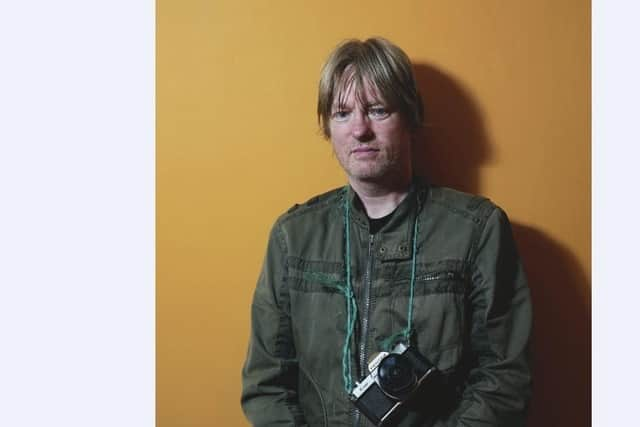Book review: Listen, by Michel Faber
The constant reinvention of Michel Faber continues, so much so that the reader really ought not be surprised that – after contemporary horror, Victorian pastiche, a string of askew and oblique novellas, a sort of sequel to the novel he said was definitively “not to be continued”, as well as public pronouncements that he was “finished” (caveat: he did say with “novels”) – he has now produced a weighty, witty tome of non-fiction about music, subtitled “On Music, Sound And Us”. If you have read interviews with Faber you will be well aware that he is (take your pick), an aficionado or a muso. But this is unlike any music book I have read.
Faber makes explicit his two aims, conducted in broadly three sections. It begins with a deliberate provocation: “Reading this book will change the way you listen. I’m not here to change your mind about Dusty Springfield, Shostakovich or Tupac Shakur or synthpop. I’m here to change your mind about your mind”. A sense of the impish suffuses the book, which is often very funny as well as piercingly acute. The big questions are how do we listen to music and why do we listen to music?
Advertisement
Hide AdThere is almost something of the conductor in the role Faber has assigned himself. He has an orchestra at his disposal that puts Mahler’s 8th to shame. Somehow the physical, skeletal and muscular aspects of making noises, the neurology, the links to mnemonics, legal ownership, why the B in R’n’B is business, cultural appropriation, the economics of the charity shop, Vinyl versus Digital, how to manufacture keeping it real, the taxonomy of forms of coolness, a rant about Chris de Burgh and why airport workers hate Brian Eno’s Music for Airports must work together with one nuanced tone. Although it is not technically a technical book, Faber can’t resist throwing in a few smarts (Eno’s music having an implied subtonic triad on D flat, which also occurs in Chopin’s Marche Funèbre) almost to prove the book has its own musicology, and is not just about the sociology of music-lovers.


But it is the writing about sociology that is the most daringly frank. Everyone – you, me, Faber – does not really know why they love the music they do. So many factors swirl, definitions are so vague, it is impossible to say anything definitively, but you would be forgiven for getting the answer right if asked the question “Based in his Paisley tie, knitted tanktop and black velveteen jacket does that individual prefer Messiaen’s Turangalila symphony or Metallica? I note with sorrow a dearth of Messiaen T-shirts. Faber has his mea culpa moment in his excellent chapter on snobbery in music, when he confesses that he just doesn’t like classical music. Where he differs from most people in being honest is in not claiming everyone who does like classical music is somehow putting it on. Faber is good on how the rituals of classical music are archaic – you still hear people tut if someone claps between movements; you still see some so enraptured their eyes are closed, while others show their approval with the time-honoured snore during Parsifal.
It is a reason I listen to Radio 3, which has done wonders in terms of music by women, music from non-European traditions, and just throwing in unusual things: I had never heard Martinu’s Gilgamesh opera, or a great many Ukrainian composers and performers. Contrariwise, I am writing this from my hospital bed where a channel called Smooth FM plays continually. I think I may have heard all of their records and even I recognise “Candle In The Wind”, “Thank You For The Music”, “A Million Love Songs” and suchlike, partially because I sometimes go into shops. Where I think Faber and I would agree is that there is a capitalist behemoth that decreases musical biodiversity.
Faber even shows some sympathy for music critics, toppled from Olympian heights down to the gladiatorial cesspits of chat-boards. The so-called criticism therein (I’ve peeked) lacks one thing: love.
Music goes last, as Sally Magnusson has written about eloquently. It has been my privilege to lead worship in local care homes, some specialising in dementia, and it’s a rare honour to see a bare flame flicker back into life at When I Survey The Wondrous Cross or Morning Has Broken. There must be a special dystopia set in 2053 when an earnest me-a-like is trying to summon some joy to the strains of James Blunt or Katy Perry.


Faber knows that “the important thing, as with all love, is that your feelings are sincere. Never pretend to love, never allow anyone to induce you to ignore, belittle or mock what you’re really fond of. Let your love be sound”. A paragraph earlier, in full Faber askance mode, he writes of the posthumous fate of his records: “the future is here and you’re not part of it”. The song fades, the singer dies, the person who always weeps at Nyman or Maxwell-Davies or the Unthanks will disappear. But the echo of the music’s influence rings on.
Listen, by Michel Faber, Canongate, £20